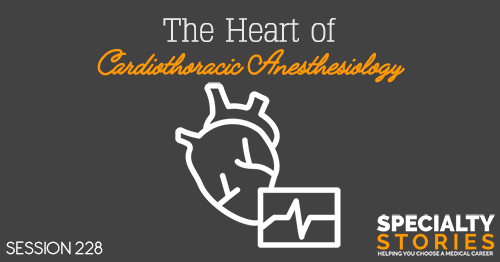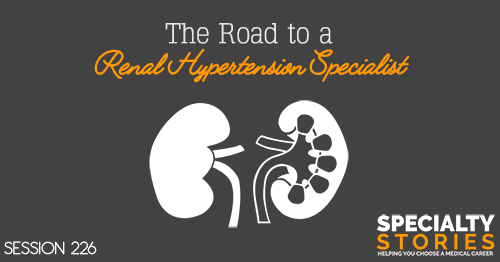Apple Podcasts | Google Podcasts
Session 183
Dr. Vana Raman is a Program/Fellowship Director and Pediatric endocrinologist. Today, she talks with me about the ‘Bread and Butter’ cases and life in the hospital. If this is something you might be interested in, check out the Pediatric Endocrine Society for more resources.
For more podcast resources to help you with your medical school journey and beyond, check out Meded Media.
Listen to this podcast episode with the player above, or keep reading for the highlights and takeaway points.
[01:39] Interest in Pediatric Endocrinology
Vana says she always knew she wanted to be a pediatrician. She went into pediatric residency wanting to be a hematologist/oncologist. Then she realized during rotation that it wasn’t her calling.
She was drawn towards endocrinology for two reasons – her mentors during residency and after she attended the diabetes camp during residency. She had the opportunity to become a volunteer physician at the diabetes camp, which she recommends to anyone interested. It was an eye opening experience for her which made her realize it was something she wanted to do for the rest of her life.
[04:27] The Biggest Myths or Misconceptions Around Pediatric Endocrinology
One misconception is that they only treat patients with diabetes, but it’s more than that. The experience of many residents is a little bit skewed. During in-patients most of their residents get a large exposure for patients with diabetes. Being a high volume center, they see a large volume of patients with diabetes. And so, when they rotate in the clinic, they realize it’s much more interesting than what they experienced during inpatient rotation.
'It's a very cerebral specialty. It's really a lot of detective work, putting the pieces of puzzles together.'Click To TweetAnother thing Vana wants to clarify is that not everybody with short stature necessarily needs growth hormone. There’s definitely a role for growth hormone, but not everyone is the right candidate for it.
A lot of times, their patients come to them with short stature during puberty. These are their bread and butter cases. And so, they need to figure out what’s causing that, hence, they need to do a workup. They found that a lot of their patients need that workup, but it’s usually something straight-forward.
[07:04] Traits that Lead to Becoming a Good Pediatric Endocrinologist
For pediatricians, Vana believes patience is a good trait or virtue to have especially because they’re working with children. And by extension, you’re treating not just the patient, but also their family.
As far as endocrinology, curiosity and problem-solving skills are important. You should like physiology, the pathways, the hormones, the things going up or down, and what regulates what.
You also have to be a good listener and have empathy especially for patients with diabetes. Because sometimes, when you’re dealing with a teenager, you have to ask them to test themselves for six or eight times a day and give insulin shots. And things are perhaps a little bit easier said than done. Additionally, they don’t get a break, even on vacations. So it helps having that empathy and putting yourself in their shoes.
[08:30] Typical Day
Vana says her typical day varies depending on her day. They have an active Fellowship Program. So Monday mornings are didactics and journal clubs and case conferences, again depending on the day of the month. And then afternoon onwards, she has clinics. If they are on service, they run with the fellows and the residents and do family-centered rounds. And some days, they have research patients or they have time for teaching.
“It's a good mix of teaching, research, as well as clinical obligations.”Click To Tweet[08:38] Life Outside of Hospital and Taking Calls
Although it hasn’t been an easy road, Vana still thinks she has a life outside of the hospital. In fact, it’s conducive for having a good work-life balance. It’s a matter of prioritizing things.
She has also found it helpful to be in an academic center and she’s fortunate to work with residents who take care of her patients when they are admitted to the hospital. She has that coverage overnight. They may also have to work with fellows so she rarely has to go in.
Most of the time, Vana takes calls from home. They have a diabetes educator that takes all “mommy calls” or “parent calls” until 10pm. And then overnight, there’s either a fellow or an attending on call. When they are on call, it typically happens one weekend a month or one weekend every other month.
On average, she gets about eight to 10 weeks a year of calls so it’s very manageable. She rarely has to go in when she’s on call, unless it’s a really sick patient with diabetic ketoacidosis or something like that. But it’s seldom that she has to go in.
[11:51] The Opportunity for Procedures in Endocrinology
In general, they’re not a heavy procedure-based field. Vana says their procedures are mostly limited to what they would call stimulation tests. However, if someone is really inclined, they can get trained to do an ultrasound of the fibroid and do a fine needle aspiration biopsy.
That being said, she rarely sees pediatric endocrinologists do that. Mostly, there are plenty of adult endocrinologists that do that. Or they would defer this to their interventional radiologists.
“It’s not a heavy procedure-based field.”Click To Tweet[13:00 The Residency and Training Path to Become an Pediatric Endocrinologist
First, you have to spend three years of general pediatrics. And towards your latter part of second year, you have to decide if this is what you want to do. Generally, applications are open in the summer of your third year which is around July. Then that would be another three years of endocrinology training. The first year, at most places, is clinical-heavy, and in the second and third year, it’s mostly research-oriented with some clinical.
As the Fellowship Program Director, what Vana looks for in fellows as potential applicants would be to know why they want to do endocrinology and what draws them to the field. Therefore, they have to be able to show a strong interest in the field. They should have done a rotation and they should have some scholarly activity or academic endeavors. This is to make sure it’s the track that they eventually would like to choose.
In their fellowship program, they train their fellows to be potential academicians. And so, having some scholarly activity is good. She’s not looking for a landmark research paper. Even a case report is fine as long as it’s rotating through pediatric endocrinology to know what you’re getting into.
Ultimately, she looks at the whole application as well as the letters of reference to make sure they have an idea of who the applicant is and to see if they’re a good fit for the program.
Vana says pediatric endocrinology is not that competitive and that there are more positions than there are applicants right now. So anyone interested in this field really has a good chance of matching at any program.
[16:59] Message to Future Osteopaths and Primary Care Physicians
Vana says she doesn’t see any negative bias against DOs. When they look at fellowship applicants from an osteopathic program, the same general rules were applied to them. At least in her program, they welcome DOs completely.
For the future primary care pediatrician out there, Vana says she has a lot of respect and really holds pediatricians in very high regard. In fact, she feels fortunate to have good collaboration with some of their pediatricians, especially in the rural areas or areas far from their center. They cover a large referral base.
And back to what she alluded to earlier, she wants to clarify that not all patients with short stature need growth hormone. So it’s important to set that expectation that with the family if you’re going to go see an endocrinologist. It doesn’t necessarily mean that you would need growth hormone or that they’re the right candidate for it. So the family should have the right expectation when they come to see them. But overall, it’s a collaborative relationship.
[20:05] Other Specialties They Work Closely With
Aside from the general pediatricians, they work closely with hematology oncology, gastroenterology, genetics, pediatric intensive care unit, and rheumatology.
[21:39] What She Wished She Knew Before Going In
Vana says it’s just something to keep in mind that it is heavily involved in terms of almost all of their patients needing labs or follow up, which really takes time. That’s why she tries to get the labs done ahead of time. So when the families come to the appointment with results, she could already reveal those and make changes as necessary.
At the same time, she gets to spend more time with the patients and the visits are longer than in general pediatrics. So there’s time built in to be able to do that follow up and follow through. But it’s always helpful to have those done ahead of time and discuss at the appointment.
[23:04] The Most and Least Liked Things
She likes that she can pick things up relatively quickly if you’re making too much of something or which hormone can suppress it if you’re not making enough. Then she can replace it. And so, instantly patients feel better. So she loves the aspect of making her patients feel better with the tools she has. She also enjoys the long-term relationship she gets to have with the families, and somehow, becoming a part of their family.
What she likes the least on the flip side, aside from the paperwork, is the amount of time it takes to do peer to peer.
[26:34] Major Changes in the Future
Continuous glucose monitors have been a game changer. Vana is a strong advocate for it and she has even used it herself. And she thinks this has made it easier on kids. That being said, they’re hybrid closed loops so you still have to enter carbs, and do corrections in terms of fully automated closed loops. But she thinks we are getting there. The discoveries and the technology that we have are only evolving. And so, there are a lot of neat things on the horizon.
[28:03] Final Words of Wisdom
If she had to do it all over again, she says yes 1000%. Finally, she wishes to tell students who might be interested in this field that there is a lot of opportunity, including clinical work non clinical work.
“If you have had an experience, mostly with diabetes, don't be biased by just that – there's a lot more to it.”Click To TweetIf you’re considering it, reach out to pediatric endocrinologists like her. They like these emails from students or residents who express their interest in rotating with them. There is a great opportunity to get involved in some of those tech or pharma companies if that’s what you’re inclined to do as well.
This is a great field since you also get to have a long-term relationship with patients. So go ahead, do a rotation, reach out to fellows and attendings. Tell them you want to come rotate with them because they need more people in this field. So just give it a try.
Links:
SEARCH SITE
LISTEN FOR FREE












